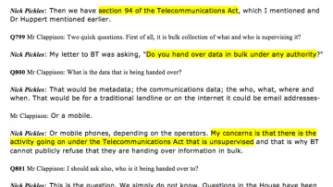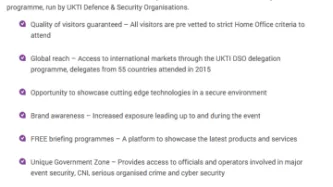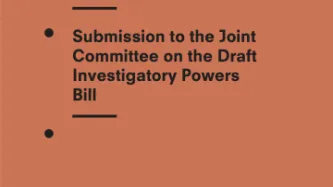Search
Content type: News & Analysis
“It’s like 10,000 spoons when all you need is a knife”. Alanis Morissette thought that was ironic. I never thought so. I suggest a far more ironic lyric to you Alanis - "It’s like the Home Office not listening during a consultation about how it wants to listen to everything you do’. OK, it might not be the catchiest lyric, but you can’t say it’s not ironic.
Today the latest version of the Investigatory Powers Bill was published. The Government might want some credit…
Content type: Long Read
1984: A broad law, a broad power and a whole lot of secrecy
In the wake of litigation brought by Privacy International (‘PI’) and as the Government prepared to introduce the Draft Investigatory Powers Bill (‘IP Bill’) in November 2015, there was a cascade of ‘avowals’- admissions that the intelligence agencies carry out some highly intrusive surveillance operations under powers contained in outdated and confusing legislation.
It is disappointing that it has been almost six months since…
Content type: Press release
Previously confidential documents published today reveal the staggering extent of UK Government surveillance that has been kept secret from the public and Parliament for the last 15 years. Revealed in a case brought by Privacy International about the use of so-called 'Bulk Personal Datasets' and a law dating back to 1984, the extracts show that the UK Government's intelligence services, GCHQ, MI5, and MI6, routinely requisition personal data from potentially thousands of public and…
Content type: News & Analysis
Section 217 and the Draft Code of Practice on Interception of Communications
Tech giants including Apple Inc, Facebook Inc, Google Inc, Microsoft Corp, Twitter Inc and Yahoo Inc have been openly critical of the UK Government’s Investigatory Power Bill (IPBill). However, what has not been highlighted is a deeply concerning Draft Code of Practice on Interception on Communications, which will not only affect telecommunications companies small and large, but result in costs to the…
Content type: News & Analysis
If you were to buy ‘Anna Karenina’ online, you would be told that people who bought Tolstoy’s classic also bought Dostoevsky’s ‘Crime and Punishment’. But if you've just read an 848 page epic Russian novel, do you really want your follow up to be a 1,008 page epic Russian novel? Maybe you want to read something very different next, maybe some contemporary American short stories, such as ’No one belongs here more than you’ by Miranda July? But you know, I don't think the…
Content type: News & Analysis
Surveillance companies and government officials from across the world are gathering in the UK this week at the invitation of the Home Office for the UK’s “Premier Security and Law Enforcement Event’, one week after the controversial spying legislation, entitled the Investigatory Powers Bill, had its first reading in Parliament.
Delegates and companies will be attending the three-day long ‘Security and Policing’ trade show in Farnborough, the historical centre of the UK’s aerospace industry.…
Content type: Advocacy
In his first report to the UN Human Rights Council (the main UN human rights political body composed of 47 states from around the world), the UN Special Rapporteur on the Right to Privacy has offered a scathing critique on the UK Investigatory Powers Bill. In particular the Rapporteur noted how bulk surveillance powers, including bulk hacking, are disproportionate and violate the right to privacy as established by human rights courts. The Rapporteur noted that the powers proposed in the…
Content type: News & Analysis
The Investigatory Powers Bill introduced on Tuesday 1 March contains the same range of ‘bulk powers’ envisaged in the earlier draft: bulk interception warrants; bulk acquisition warrants; bulk equipment interference warrants; and bulk personal dataset warrants.
These powers, if adopted as currently envisaged in the Bill, would codify a practice of mass, untargeted surveillance by the UK intelligence services.
In the last couple of years, some of the mass surveillance powers used by…
Content type: Press release
In response to the Investigatory Powers Tribunal (IPT) ruling today that GCHQ's hacking is lawful, we have issued the following press statement:
"We are disappointed by the IPT’s judgment today, which has found Government hacking lawful based on a broad interpretation of a law dating back to 1994, when the internet and mobile phone technology were in their infancy.
Until we brought this case, GCHQ would neither confirm nor deny that it was they were engaging in mass hacking of…
Content type: Long Read
The Investigatory Powers Tribunal (“IPT”) today held that GCHQ hacking of computers, mobile devices and networks is lawful, wherever it occurs around the world. We are disappointed that the IPT has not upheld our complaint and we will be challenging its findings.
Our complaint is the first UK legal challenge to state-sponsored hacking, an exceptionally intrusive form of surveillance. We contended that GCHQ hacking operations were incompatible with democratic principles and human rights…
Content type: Press release
Today’s report by the Joint Committee on the Investigatory Powers Bill is the third committee report that concludes that the Home Office has failed to provide a coherent surveillance framework.
The Joint Committee on the Investigatory Powers Bill today published a 198 page report following a short consultation period between November and January. Their key findings are that:
- the definitions in the bill need much work, including a meaningful and comprehensible…
Content type: News & Analysis
The problems with thematic warrants and why they should be removed from the UK Government’s Investigatory Powers Bill
We currently have the rare opportunity to scrutinise and debate the powers that law enforcement, the security and intelligence agencies and public bodies should have to interfere with our private communications, our devices and our digital lives. These powers are being enshrined and expanded upon in the draft Investigatory Powers Bill (IP Bill), currently under scrutiny by the…
Content type: Press release
Gus Hosein, Executive Director, Privacy International said:
“Parliament's Intelligence and Security Committee (ISC) has today slammed the Government’s draft Investigatory Powers Bill for its lack of transparency, lack of clarity and lack of privacy protections. We urge the Home Office to take on board the wide ranging criticisms that the tech sector, civil society, and now even the Parliamentary committee that oversees the surveillance capabilities of the intelligence agencies, have made of…
Content type: Advocacy
In response to the Government publishing proposed new surveillance powers in November 2015, Privacy International submitted this highly detailed analysis to the Joint Committee on the Draft Investigatory Powers Bill in December. Our report proposes significant changes across the Bill to ensure better privacy protection while still enabling public bodies to have the powers they need.
Content type: Press release
Privacy International welcomes the Committee’s report on the draft Investigatory Powers Bill (IP Bill). The report mirrors what many from across the technology sector and civil society have been saying: the lack of clarity in the draft Bill risks undermining security and privacy.
The Committee encountered almost universal confusion regarding the meaning of “Internet Connection Records” and what the collection of such records would entail. …
Content type: News & Analysis
In 2015 the United Nations' human rights mechanisms significantly increased their capacity to monitor and assess states' compliance with their obligations around the right to privacy. Notably, the Human Rights Council established the mandate of the Special Rapporteur on the right to privacy, filling a significant gap in the international human rights protection system. Meanwhile, the Human Rights Committee put surveillance laws and practices in a range of countries under close scrutiny, making…









